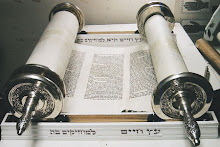|
|
 |
| In the seventh month, on the first day of the month, you shall observe a day of solemn rest, a memorial proclaimed with blast of trumpets, a holy convocation. - Lev 23:24 |
|
| ||||||||||||||||||||||||||
| Elul and Selichot On the week before Rosh Hashanah, at the end of the month of Elul, the atmosphere of repentance is intensified by the addition of selichot. Selichot are special prayers for forgiveness recited in the early hours of the morning at the synagogue. The addition of selichot helps prepare us for the coming days of reflection and self-examination. On the day before Rosh Hashanah, called Erev Rosh Hashanah, Orthodox men will undergo a mikveh (ritual bath). The parokhet (ark cover) in the synagogue is changed to a plain white cloth, indicating purity. It is traditional at this time to greet one another with L'Shanah Tovah Tikatevu! ("May you be inscribed (in the Book of Life) for a good year!") and to respond with gam lekha (same to you): |
 | |||||||
| Rosh Hashanah is also known as Yom Teru'ah, the "Feast of Trumpets" (the name was changed during Talmudic times, see below). Tradition stated that the universe was created by the LORD on Rosh Hashanah (or on Elul 25, so that Rosh Hashanah marks the sixth day of creation, when the LORD created Adam and Eve). Note that Rosh Hashanah is also called "Yom ha-Zikaron," the "Day of Remembrance" (Lev. 23:24) in reference to the commandment to remember to blow the shofar (teruah) to coronate God as King of the Universe. The blast of the shofar is meant to jolt us from our sleep. We are to remember who we really are by remembering that the LORD is our King. | |||||||
 | |||||||
| The Liturgy and the Theme of Rosh Hashanah | |||||||
| According to Jewish tradition, on Rosh Hashanah the destiny of the righteous, the tzaddikim, are written in the Book of Life, and the destiny of the wicked, the resha'im, are written in the Book of Death. However, many people (perhaps most people) will not be inscribed in either book, but have ten days -- until Yom Kippur -- to repent before sealing their fate. Hence the term Aseret Yemei Teshuvah - the Ten Days of Repentance. On Yom Kippur, then, everyone's name will be sealed in one of the two books. Consequently, many synagogue prayers are invocations to be made worthy to be written in the Book of Life. Sermons about the need for repentance and the themes of God's judgment are often delivered during this time. The Kingship of God is stressed throughout the services as well. |
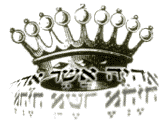 | |||
| Torah Readings for Rosh Hashanah | |||
|
| The Torah portion for the first day of Rosh HaShanah is about the birth of Issac, and the portion for the second day is on the Akedah, or the binding of Issac. The Musaf (additional service) includes extra benedictions added to the normal Amidah, emphasizing God's Kingship, the remembrance of our days, and the call of the shofar to usher in the Messianic Kingdom at the end of days. |
| Sounding the Shofar |
| The shofar (ram's horn) is the most-mentioned musical instrument in the Scriptures. It is blasted at least 100 times during a typical Rosh Hashanah service, thus satisfying the commandment to make Teru'ah ("noise") on this day. (There is a "darker" tradition that says the 100 blasts symbolize the the number of letters in Sisera's mother's lament for her son as recorded in the "Song of Deborah" (Judges 5:28). According to some of the rabbis, it is suggested that sounding the 100 blasts "nullifies" all of the letters corresponding to her thoughts but one -- the sorrow of a grieving mother.) The sound of the shofar, then, is meant to stir the heart to fear and to inspire teshuvah (repentance): "When the shofar is blown in the city, don't the people tremble?" (Amos 3:6).
The general custom is to first blow tekiah, followed by shevarim, followed by teruah, and to close with tekiah hagadol: |
| |
|
| The order of the blasts may vary according to various Jewish custom, and they may be heard at different points in the Rosh HaShanah service (for example, at the start of the service, after the Torah reading, after reading parts of the Amidah blessings, etc.) If Rosh Hashanah happens to fall on a Shabbat, no shofar blasts will be heard (since carrying a shofar is considered work) but the shofar will be sounded on the Second Day of Rosh Hashanah (this holiday, like most Jewish holidays, lasts for two days because of the difficulty of determining the exact time of the new moon). An expert in blowing the shofar is called baal tekiah, by the way. |
| Minhagim (Customs) of Rosh Hashanah | |||||||||||||
| Special customs (minhagim) observed on Rosh Hashanah include:
| |||||||||||||
| "He will again have compassion on us; he will tread our iniquities under foot. You will cast (tashlikh) all our sins into the depths of the sea." | |||||||||||||
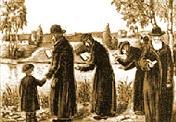 | |||||||||||||
| The Ten Days of Repentance | |||||||||||||
| As mentioned above, most people are neither entirely righteous (tzaddikim) nor entirely wicked (resha'im) on the day of Rosh Hashanah. The Aseret Yemei Teshuvah, or Ten Days of Repentance, provide a time for us to repent and turn whole-heartedly to the LORD in order to be sealed into the Book of Life. These days set the tone for the coming most holy Day of Atonement. Teshuvah, Tehillah, and Tzedakah - repentance, prayer, and charity - these are the spiritual virtues of the High Holidays, and the mood of the Tashlikh ceremony is based upon their heightened observance. | |||||||||||||
| Yom Teruah or Rosh Hashanah? | |||||||||||||
| In the Torah, the first day of the seventh month is to be commemorated as Yom Teruah (יוֹם תְּרוּעָה), sometimes translated as the "Feast of Trumpets" (Num. 29:1, Lev. 23:24). The word teruah means "shouting" or "raising a noise," and therefore this day was to be marked by making a joyful noise unto the LORD (Psalm 81:1-4). Of all the moedim (holidays), Yom Teruah is unique because 1) it's the only holiday that begins on a New Moon and 2) there is no explicit reason given in the Torah for its observance other than to "rest" and to offer sacrifice (Num. 29:1, Lev. 23:24). After the Second Temple was destroyed in 70 AD, however, the sages of the Mishnah redefined Judaism and associated Yom Teruah with the start of the Jewish civil year. Yom Teruah then became known as "Rosh Hashanah" (the head of the year).
Trumpets and Shofars
Silver trumpets (חֲצוֹצְרת, cha-tzotz-rot) were originally used to signal camp movements during the journey to the Promised Land (Num. 10:1-2). Later they were used by the Levites during various Temple rituals, especially during the offering of animal sacrifices (Num. 10:10).
They were also sometimes used in times of warfare (Num. 10:9; 31:6; 2 Chr. 13:12-14).
|
| God is King over all the Earth |
| The Mishnah (Sanhedrin 38b) states that Adam and Chavah were created on Rosh Hashanah (i.e., Tishri 1). But how did the sages determine this date? By transposing the Hebrew letters of the very first word of the Hebrew Scriptures:
|
| The Christian and Rosh Hashanah | |||
| There are many things the Christian can learn from the Jewish observance of Yamin Nora'im and Rosh Hashanah that are helpful in our walk as talmidim (followers, students) of the Mashiach Yeshua: First, the LORD God is indeed the King of all the earth, our Creator and Redeemer. He is Melech Gadol al-kol-ha'aretz, (מֶלֶךְ גָּדוֹל עַל־כָּל־הָאָרֶץ), a "great King over all the earth" (Psalm 47:2). Though Christians should acknowledge His righteous rule and Kingship at all times, Rosh Hashanah is a "sanctified reminder" of God's creative authority in our lives. Yeshua (Jesus) is called the Mashiach (מָשִׁיחַ), a term that denotes His Kingly dignity and royalty. He is also the Creator and Sustainer of all creation (Col. 1:16). He is coming to rule and reign from Jerusalem (Zion) in the near future. Christians will be judged according to their deeds of service (2 Cor. 5:10) and the world system (and Satan) will be judged during the Great Tribulation period that precedes the Second Coming. Just as the heavenly shofar was sounded from Sinai, so it will be one day sounded from Zion (Isa. 27:13). As the only true King and Judge, God indeed has a Sefer HaChayim (Book of Life) as well as a Sefer Ha-Metim (Book of Death). The Scriptures clearly warn that on the Day of Judgment to come, anyone's name not found written in the Book of Life will be thrown into the lake of fire (Rev. 20:15). Second, the month of Elul and the preparation for Rosh Hashanah reminds us to be ready for the soon appearance of King Yeshua our LORD. Though we do not know the exact day or hour of His return to possess His kingdom on earth, we are commanded to watch and be ready for His soon appearance. We ought, therefore, be in a constant state of repentance (teshuvah) as we seek to humble ourselves and walk with our God. The New Testament links teshuvah with salvation (יְשׁוּעָה) itself. Yeshua's first message was "Repent and believe the gospel (בְּשׂוֹרָה)" (Mark 1:15), and Paul linked teshuvah with confession and trust in the saving work of the Messiah on our behalf (Rom. 10:8-13). Teshuvah implies a response to the Person of Yeshua that is demonstrated through confession that He is none other than YHVH, the LORD of Compassion and grace. The sound of the shofar is meant to awaken our hearts and to prepare for coming judgment. Third, Rosh Hashanah itself, or rather Yom Teru'ah, has prophetic significance in the life of the Christian. The blowing of the shofar is prophetic of the rapture of the church, where those who are part of the Bride of Mashiach, the church, will experience everlasting transformation: "Behold, I show you a mystery; We shall not all sleep, but we shall all be changed, in a moment, in the twinkling of an eye, at the last trumpet (shofar): for the trumpet (shofar) shall sound, and the dead shall be raised incorruptible, and we shall be changed." (1 Corinthians 15:51) The Talmud states that on Rosh Hashanah the dead will be raised (Rosh Hashanah 16b). This corresponds to the "last trump" mentioned by the Apostle Paul (1 Cor. 15:52). Fourth, the Tashlikh ceremony reminds us that our LORD is a God of new beginnings, and even if we have sinned and fallen away from Him, He is faithful to restore us and cast our sins away from us. After all, God sent His only Son Yeshua to be our Sin-Bearer and Kapparah, so we can take comfort in His forgiveness when we earnestly seek to repent from the harm we have done and begin anew with God.
Fifth, we should be grateful to the LORD for writing our names in the Lamb's Book of Life, or Sefer HaChayim. Of course we do not believe that we are made acceptable in the LORD's eyes by means of our own works of righteousness (Titus 3:5-6), but that does not excuse us from being without such works (as fruit of the Spirit in our daily life).
| |||
| Preparing for Rosh Hashanah | |||
| How do we prepare for Rosh Hashanah? Traditionally we prepare through three types of turning: 1) turning to God (tefillah); 2) turning to others we've harmed or offended (teshuvah), and 3) turning to those in need (tzedakah). In all three cases we can genuinely return to God only by choosing to embrace the truth about our lives. Our prayers (tefillot) are offered in the plural, emphasizing that we are all interconnected. This is the idea of kol Yisrael arevim zeh bazeh: "All Israel is responsible for one another" (Talmud Shavuot 39a). We are all one "body" and should one member hurt, we all are diminished (1 Cor. 12:26). Avinu Malkenu - "Our Father, our King..." Our teshuvah means that we honestly examine ourselves and repair any breach we might have created in our relationships (James 5:16). And our tzedakah means that we turn away from ourselves entirely, considering the needs of others and their welfare instead of our own. May it please the LORD to help us all turn to Him for life! | |||
| Terms relating to Rosh Hashanah | |||
|
| Traditional Rosh Hashanah Greetings (Unicode Hebrew) |
| "May you be inscribed and sealed for a good year!"
You might also add: "Immediately, for a good life and for peace."
The most common form of Rosh Hashanah greeting is simply: L'Shanah Tovah Tikatevu! ("May you be inscribed (in the Book of Life) for a good year!") and to respond with gam lekha (same to you) or simply gamzu (also to you): |
| |
| ||||||||||||||||||||||||||||||||||||
| |
| Hebrew for Christians Copyright © John J. Parsons All rights reserved. | |||||
Jewish Festivals and Fasts
Welcome to the Jewish Calendar here you will be able to find out all calendar information such as times and dates of all Jewish festivals and fasts. Please be aware that many festivals do come in on the evening before the festival start date.
Sorry, Please follow the link below and you'll be redirected to original homepage. Desculpe, para acessar os itens abaixo, gentileza ir para: http://www.theus.org.uk/jewish_living/jewish_calendar/list_of_festivals_and_fasts/| Festival | 2010 (5770-5771) | 2011 (5771-5772) |
|---|---|---|
| Tu Bishvat | Sat Jan 30th 15 Shevat | Thu Jan 20th 15 Shevat |
| Fast of Esther | Thu Feb 25th 11 AdarI | Thu Mar 17th 11 AdarII |
| Purim | Sun Feb 28th 14 AdarI | Sun Mar 20th 14 AdarII |
| Shushan Purim | Mon Mar 1st 15 AdarI | Mon Mar 21st 15 AdarII |
| Fast of the Firstborn | Mon Mar 29th 14 Nisan | Mon Apr 18th 14 Nisan |
| Pesach | Tue Mar 30th - Tue Apr 6th 15 Nisan - 22 Nisan | Tue Apr 19th - Tue Apr 26th 15 Nisan - 22 Nisan |
| Yom Hashoah | Sun Apr 11th 27 Nisan | Sun May 1st 27 Nisan |
| Yom Hazikaron | Sun Apr 18th 4 Iyyar | Sun May 8th 4 Iyyar |
| Yom Ha'atzmaut | Mon Apr 19th 5 Iyyar | Mon May 9th 5 Iyyar |
| Lag B'Omer | Sun May 2nd 18 Iyyar | Sun May 22nd 18 Iyyar |
| Yom Yerushalayim | Wed May 12th 28 Iyyar | Wed Jun 1st 28 Iyyar |
| Shavuot | Wed May 19th - Thu May 20th 6 Sivan - 7 Sivan | Wed Jun 8th - Thu Jun 9th 6 Sivan - 7 Sivan |
| Fast of Tammuz | Tue Jun 29th 17 Tammuz | Tue Jul 19th 17 Tammuz |
| Tisha B'Av | Tue Jul 20th 9 Av | Tue Aug 9th 9 Av |
| Rosh Hashanah | Thu Sep 9th - Fri Sep 10th 1 Tishri - 2 Tishri | Thu Sep 29th - Fri Sep 30th 1 Tishri - 2 Tishri |
| Fast of Gedalliah | Sat Sep 11th 3 Tishri | Sat Oct 1st 3 Tishri |
| Yom Kippur | Sat Sep 18th 10 Tishri | Sat Oct 8th 10 Tishri |
| Succot | Thu Sep 23rd - Wed Sep 29th 15 Tishri - 21 Tishri | Thu Oct 13th - Wed Oct 19th 15 Tishri - 21 Tishri |
| Hoshannah Rabbah | Wed Sep 29th 21 Tishri | Wed Oct 19th 21 Tishri |
| Shemini Atzeret | Thu Sep 30th 22 Tishri | Thu Oct 20th 22 Tishri |
| Simchat Torah | Fri Oct 1st 23 Tishri | Fri Oct 21st 23 Tishri |
| Chanukah | Thu Dec 2nd - Fri Dec 10th 25 Kislev - 3 Tevet | Wed Dec 21st - Thu Dec 29th 25 Kislev - 3 Tevet |
| Fast of Tevet | Fri Dec 17th 10 Tevet | Thu Jan 5th 10 Tevet |
 | Festas Bíblicas |
| A Bíblia em Bytes online - Festas Bíblicas www.bibliabytes.com.br |
| Shabat | Chanucá | Purim | Pessach | Châmets |
| Descanso | Dedicação | Sortes | Páscoa | Pães Asmos |
| D'us acaba a obra que fizera e descansa no sétimo dia. | A reconsagração do Templo | História de Ester conta que o povo Judeu seria externinado | Morte do Cordeiro; sangue na verga da porta, saldo do anjo da morte. Ex 12:6-7 | Purificação de todo o fermento |
| D'us cria o dia de Descanso GN 2:2, Ex 31:12-15 | 2Cr 3-4:22 | Livro de Ester | 1° mês 14° dia Lv 23:5 | 1° mês, 15° dia, durante 7 dias Lv 23:6-8 |
| Bicurim | Shavuot | Teruah | Rosh Hashanah, Yom Hippur | Sucot |
| Primícias | Pentecostes ou Festa das Semanas | Festa das Trombetas | Dia da Expiação Dia do perdão | Festa de Tabernáculos, festa das cabanas |
| Movimento das primícias da colheita | Molho de oferta movida de dois pães asmos | Toque das trombetas(shophar) - santa convocação | Naquele dia se fará expiação por vós para purificar-vos Lv 16:30 | Celebração da colheita; memorial das tendas no deserto |
| Dia depois do Sábado Lv 23:9-14 | 50 dias após a Festa das Primícias Lv 23:15-21 Cl 2:16 | 7° mês 1° dia Lv 23:23-25 | 7° mês 10° dia Lv 23:26-32 | 7° mês, 15° dia, por 7 dias. Oitavo dia santa convocação Lv 23:33-44 |

 Estude a Bíblia com tecnologia. Utilize o software "A Bíblia em Bytes" como
ferramenta de pesquisas, elaborando seus próprios estudos. Instale uma em
seu computador. Recursos: {Acha versículo, Chave Bíblica, Leitura do capítulo,
Profecias, Mapas, Código de Cores, Histórias e Assuntos, Estudos Personalizados,
Leitura Diária, Missões, Esboço do Livro, Exporta p/Winword, ALT-B, Exportar p/Telão, etc...}
Faça seu pedido, clique aqui Shopping da A Bíblia em Bytes®
http://www2.uol.com.br/biblia/
Estude a Bíblia com tecnologia. Utilize o software "A Bíblia em Bytes" como
ferramenta de pesquisas, elaborando seus próprios estudos. Instale uma em
seu computador. Recursos: {Acha versículo, Chave Bíblica, Leitura do capítulo,
Profecias, Mapas, Código de Cores, Histórias e Assuntos, Estudos Personalizados,
Leitura Diária, Missões, Esboço do Livro, Exporta p/Winword, ALT-B, Exportar p/Telão, etc...}
Faça seu pedido, clique aqui Shopping da A Bíblia em Bytes®
http://www2.uol.com.br/biblia/
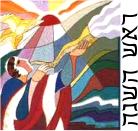

 These silver trumpets are to be distinguished from the ram's horn trumpet (
These silver trumpets are to be distinguished from the ram's horn trumpet (
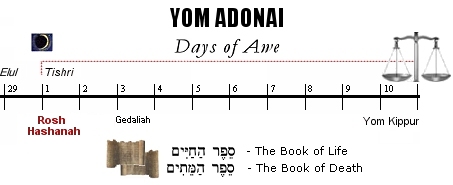
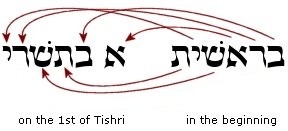 In other words, by rearranging the letters of the word bereshit ("in the beginning"), the phrase aleph b'Tishri ("on the 1st of Tishri") was formed, and therefore this date became associated with the anniversary of creation (or rather, the creation from Adam's perspective, i.e., the sixth day).
Rosh Hashanah therefore represents the day that God began to rule as King of the Universe. When Adam first opened his eyes and human consciousness was born, he immediately understood that the LORD created all things, including himself. According to midrash, Adam's first words were, "The LORD is King for ever and ever." God then said, "Now the whole world will know that I am King," and He was very pleased. The birthday of humanity is therefore the Coronation Day for the King of the Universe. Psalm 47 celebrates the Kingship of God that mentions the "shout" (teruah) and shofar blast of God's coronation:
In other words, by rearranging the letters of the word bereshit ("in the beginning"), the phrase aleph b'Tishri ("on the 1st of Tishri") was formed, and therefore this date became associated with the anniversary of creation (or rather, the creation from Adam's perspective, i.e., the sixth day).
Rosh Hashanah therefore represents the day that God began to rule as King of the Universe. When Adam first opened his eyes and human consciousness was born, he immediately understood that the LORD created all things, including himself. According to midrash, Adam's first words were, "The LORD is King for ever and ever." God then said, "Now the whole world will know that I am King," and He was very pleased. The birthday of humanity is therefore the Coronation Day for the King of the Universe. Psalm 47 celebrates the Kingship of God that mentions the "shout" (teruah) and shofar blast of God's coronation:
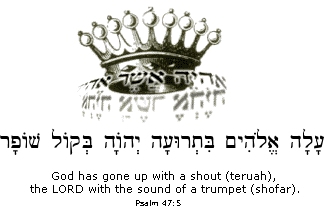
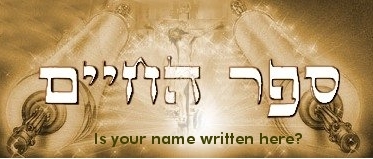 Sixth, the
Sixth, the 